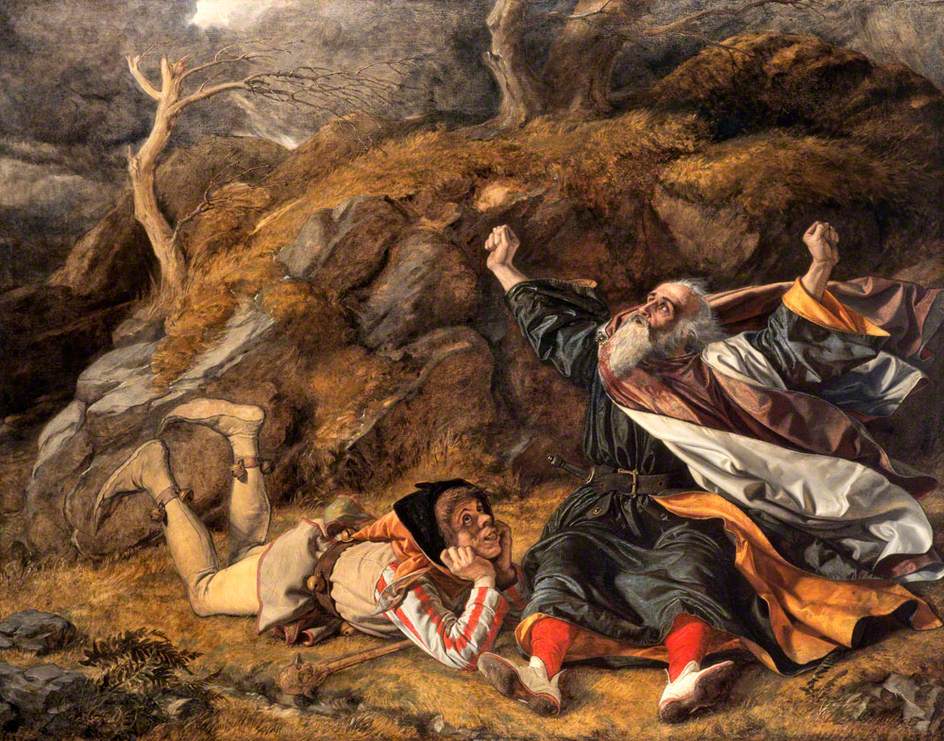Note: If you wish to receive, via e-mail, (1) my weekly newsletter or (2) daily copies of these posts, write to me at rrbates1951@gmail.com. Comments may also be sent to this address. I promise not to share your e-mail with anyone. To unsubscribe, write here as well.
Wednesday
Today I turn 73, a number that has special significance for me since in 1973 I both married Julia and graduated from Carleton. To celebrate, I’m sharing this fun poem on retirement lessons taken from King Lear. Although I retired six years ago, David Wright’s poem applies to aging as well. To love the play (as I do) is to appreciate the poem, especially its humor.
Lear’s problem is that he wants to abandon the cares of being king while surrendering none of a king’s privileges. To engineer this, he has come up with a “still untested pension plan.” An insecure control freak, he also tries to engineer the love of his daughters, which backfires spectacularly.
For the first 13 lines of his poem, Wright suggests things that Lear could do, and not do, to make his post-retirement life better:
“Lines on Retirement, after Reading Lear”
By David Wright
for Richard PacholskiAvoid storms. And retirement parties.
You can’t trust the sweetnesses your friends will
offer, when they really want your office,
which they’ll redecorate. Beware the still
untested pension plan. Keep your keys. Ask
for more troops than you think you’ll need. Listen
more to fools and less to colleagues. Love your
youngest child the most, regardless. Back to
storms: dress warm, take a friend, don’t eat the grass,
don’t stand near tall trees, and keep the yelling
down—the winds won’t listen, and no one will
see you in the dark. It’s too hard to hear
you over all the thunder.
At this point in the poem, however, Wright changes direction. “But you’re not Lear,” he tells us—or himself—and then suggests a different approach to the storm.
But you’re not
Lear, except that we can’t stop you from what
you’ve planned to do. In the end, no one leaves
the stage in character—we never see
the feather, the mirror held to our lips.
So don’t wait for skies to crack with sun. Feel
the storm’s sweet sting invade you to the skin,
the strange, sore comforts of the wind. Embrace
your children’s ragged praise and that of friends.
Go ahead, take it off, take it all off.
Run naked into tempests. Weave flowers
into your hair. Bellow at cataracts.
If you dare, scream at the gods. Babble as
if you thought words could save. Drink rain like cold
beer. So much better than making theories.
We’d all come with you, laughing, if we could.
Wright is reminding us that we’re all going to die. “No one leaves the stage in character,” he notes, with “the feather, the mirror held to our lips” referring to Lear having to acknowledge Cordelia’s death. The storm that is coming is the final storm so “don’t wait for the skies to crack with sun.”
Rather, learn to love whatever time you have left, even if you are experiencing some version of cataracts and huricanoes blowing, cracking, drenching and drowning with “sulphurous and thought-executing fires” (to quote from Lear’s storm-defying rant). Since Lear’s useless orders to the storm can be seen as an attempt to persuade himself he’s still in control, Wright suggests taking another tack. “Feel the storm’s sweet sting invade you to the skin,” he advises, “the strange, sore comforts of the wind.”
In fact, open yourself fully to old age. Instead of trying to get those around you to tell you exactly what you want to hear, “embrace your children’s ragged praise and that of friends.” In fact, forget about dignity:
Go ahead, take it off, take it all off.
Run naked into tempests. Weave flowers
into your hair. Bellow at cataracts.
If you dare, scream at the gods. Babble as
if you thought words could save. Drink rain like cold
beer.
The ”weaving flowers” is what Cordelia reports of her now-insane dad:
Alack, ’tis he! Why, he was met even now
As mad as the vexed sea, singing aloud,
Crowned with rank fumiter and furrow-weeds,
With hardocks, hemlock, nettles, cuckooflowers,
Darnel, and all the idle weeds that grow
In our sustaining corn.
Lear’s tragedy is that, by thinking he could have everything, he lost everything. Maybe that’s what Wright means by “making theories.” So since such planning doesn’t work—and wouldn’t even if Lear were far more careful than he was—then why not let it all hang out? Carl Jung, who feared that the figure of the wise old sage could become stultifying, talked about how an old fool could release new life energies. So did W.B. Yeats in his Crazy Jane poems. Wright may have this in mind when he says, “We’d all come with you, laughing, if we could.”
I can assure my loved ones that, having reached 73, I’m not going to start running around naked in the rain and weaving flowers into my hair. But I also have no illusion that I am some fount of wisdom that everyone should revere. I’m just someone stumbling through old age trying to make sense of things. And working to appreciate “the storm’s sweet sting.”


